
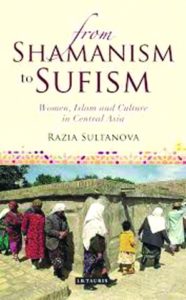
From Shamanism to Sufism: Women, Islam and Culture in Central Asia
Razia Sultanova
I.B.Tauris (2011)
Women have traditionally played a vital part in Islam throughout Central Asia – the vast area from the Caspian Sea to Siberia. With this ground-breaking and original study, Razia Sultanova examines the experiences of Muslim women in the region and the ways in which religion has shaped their daily lives and continues to do so today. ‘From Shamanism to Sufism’ explores the fundamental interplay between religious belief and the cultural heritage of music and dance and is the first book to focus particularly on the role of women. Ritual and music are at the heart of Central Asian and Islamic culture, not only at weddings and funerals but in all aspects of everyday life. Through her in-depth analysis of these facets of cultural life within Central Asian society, ‘From Shamanism to Sufism’ offers important insights into the lives of the societies in the region. The role of women has often been neglected in studies of religious culture and this book fills an enormous gap, restoring women to their rightful historical and cultural context. It will be essential reading for anyone with a serious interest in the History or Religion of Central Asia or in Global Islam.
Razia Sultanova is a fellow at Cambridge Central Asia Forum, University of Cambridge and director of the Centre for Central Asian music. She graduated from Uzbek State Conservatory and was awarded her PhD by Moscow State Conservatory, where she is visiting professor. She has also worked as a Research Fellow at Goldsmith’s College and at the School of Oriental and African Studies, University of London. Her interests extend from Russian and Central Asian to Middle Eastern culture and music. Razia Sultanova was the editor of a special issue of the Journal Ethnomusicology Forum, entitled ‘Music and Identity in Central Asia’ (2005); a special issue of the journal Cahiers de musiques traditionelles entitled ‘Entre Femmes’ (2005) and the book ‘Sacred Knowledge: Schools or revelation? Master-Apprentice System of Oral Transmission in the Music of the Turkic Speaking World’ (2009).

Shi’ism (New Edinburgh Islamic Surveys)
Heinz Halm
Edinburgh University Press (2004)
Heinz Halm’s work presents a thorough and accessible discussion of the history, theology, and current state of this branch of Islam. Newly revised, Shi’ism includes updated information on the fate of the Shi’ite revolution in Iran as well as a new chapter on Iraq.
Observing a tradition more than 1000 years old, Shi’ites represent 10 percent of the Muslim population, or 100 million people. Halm explores how Shi’ism differs from the rest of Islam, discussing the prominence of its authorities, the Imams, as well as its legal system, practices of worship, places of pilgrimages, and a religious ethos characterized by a fervor to suffer for the cause.
Additionally, Halm provides a lucid survey of the various branches of Shi’ism, paying attention to their historical, organizational, and theological developments. The book also considers the appeal and impact of Imams in contemporary Shi’ism and their interpretation of the social and economic problems gripping the Islamic world.
Heinz Halm is professor of Islamic studies at the University of Tubingen, Germany. He is the author of several books on Islam, including Shi’a Islam: From Religion to Revolution.
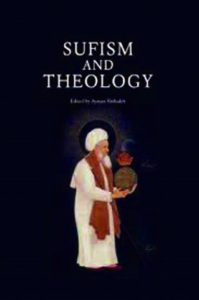
Sufism and Theology
Ayman Shihadeh
Edinburgh University Press (2007)
Sufism and Theology are two major currents in Islamic thought and religious culture, and over the centuries they have displayed immense diversity and intellectual richness. This book takes a flexible and inclusive approach to these trends, revealing both how Sufis approached theological traditions and themes and practised theology themselves, and how theologians approached different aspects of Sufism.
Comprising chapters by leading specialists in the field, this volume is the first to explore the historically complex interface between these two major currents, highlighting key points of tension and interaction. Taking us through an array of subjects, including hermeneutics, psychology and metaphysics, light is shed on major intellectual trends and figures from the 12th century up to the modern period. These range from al-Hallaj, Ibn ‘Arabi and Ibn Sab’in, to Fakhr al-Din al-Razi, Ibn Taymiyya, Haydar Amuli and Ibn Kemal Pasha, from the Ottoman context to the Safavid, and from Sunnism to Shi’ism.
Ayman Shihadeh is Lecturer in Islamic Studies and Arabic at the University of Edinburgh.
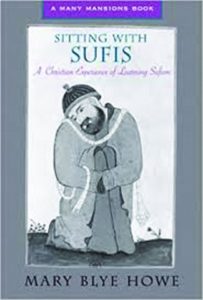
Sitting With Sufis: A Christian Experience of Learning Sufism
Mary Blye Howe
Paraclete(2005)
The sequel to A Baptist Among the Jews is another spiritual journey, this time into the Sufi traditions, including the mysteries of the sema, which is the meditation movement that made Rumi famous. Original.
The Christian author of A Baptist Among the Jews continues her walk through the Abrahamic religious traditions with this spiritual memoir of her introduction to and practice of Sufism, the mystical branch of Islam. Sufism in America is known to many through the poetry of Rumi, and Howe’s experience reflects this; she quotes the popular poet frequently as she tells her own story, which begins with a retreat in Texas that introduced her to Sufism’s prayers and rituals. Her narrative paints Sufism in lively action, including the whirling ecstatic dance known as sema and the repetitive chanting prayer known as zhikr. Howe says her Christian journey began at a point of “spiritual rigidity” but evolved to make room for ritual and mystery, which she found first in Judaism and subsequently in devotional Sufism. The insights and practices she has learned in these traditions that are related to Christianity serve to deepen and intensify her relationship with God. Those curious about the content, history or structure of Sufism and its many sects will need another book that more specifically addresses Sufi beliefs and practices. However, those seeking to affirm the universalism of core teachings of different religions, and those drawn to the mystical religious path, will welcome this small memoir.
Mary Blye Howe (Duncanville, TX) is a cradle Southern Baptist who has found a warm, welcoming second home among several Jewish congregations in the Dallas, Texas area. She has published over 100 articles in more than 60 diverse periodicals, including Entrepreneur, the Dallas Morning News, and the Chicago Tribune.
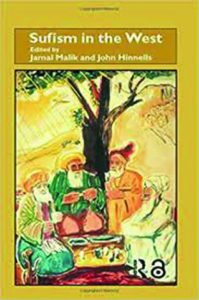
Sufism in the West
Jamal Malik, John Hinnells
Routledge (2006)
With the increasing Muslim diaspora in post-modern Western societies, Sufism – intellectually as well as sociologically – may eventually become Islam itself due to its versatile potential. Although Sufism has always provoked considerable interest in the West, no volume has so far been written which discusses this aspect of Islam in terms of how it is practised in Western societies.
Bringing together leading international authorities to survey the history of Islamic mysticism in North America and Europe, this book elaborates the ideas and institutions which organize Sufism and folk-religious practices. The chapters cover: the orders and movements, their social base, organization and institutionalization, recruitment-patterns in new environments, channels of disseminating ideas, such as ritual, charisma, and organization, reasons for their popularity among certain social groups, the nature of their affiliation with the countries of their origin. Providing a fascinating insight into how Sufism operates within different spheres of society, Sufism in the West is essential reading for students and academics with research interests in Islam, Islamic history and social anthropology.
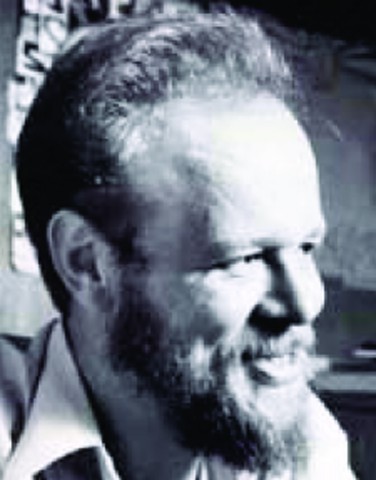
John Hinnells is former Professor and founding chair of the Department for the Study of Religion at the School of Oriental and African Studies, London University. His main research interest is in Zoroastrianism and has also edited the New Penguin Dictionary of Religions and the New Penguin Handbook of Living Religions.
Jamal Malik is Chair of Religious Studies and Islamic Studies at the University of Erfurt, Germany. His areas of interest and research are Islamic Religion, Social History of Muslim South Asia, Colonialism and Political Islam, Islamic Mysticism and Muslims in the West.


